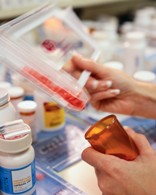
Contributor: Crystal Karges, MS, RDN, IBCLC Special Projects Coordinator at Eating Disorder Hope/Addiction Hope
Many prescription medications have addictive properties, which can increase a desire to continue use, even if only taken for a short time period. Some of the prescription medications that are generally more addictive include painkillers, sedative medications, tranquilizers, depressants, and stimulants. There is often a misconception that because a medication is prescribed by a doctor and administered by a pharmacist that the medication is completely safe.
Addiction is a Side Effect
While most medications on the market are regulated by the Food and Drug Administration and tested for effectiveness, there are always side effects involved with taking prescription medications. Some side effects may be more severe than others and widely depend on the individual who is taking the prescription medication. Prescription medications, particular those with addictive properties, alter and change chemicals in the brain, which can induce a physiological response to the drug.
 Many individuals may also become addicted to the effect that results from taking a certain medication, such as the euphoric effect that results from tranquilizers or sedation drugs. As the body acclimates to the level of medication that is being taken, a person likely has to increase the dosage to induce the same type of desired effect. This can lead to the misuse of the medication.
Many individuals may also become addicted to the effect that results from taking a certain medication, such as the euphoric effect that results from tranquilizers or sedation drugs. As the body acclimates to the level of medication that is being taken, a person likely has to increase the dosage to induce the same type of desired effect. This can lead to the misuse of the medication.
Certain individuals are more likely to abuse prescription medications and should approach use of these drugs with caution. This includes individuals who have a history of abusing another substance, such as alcohol or other drugs, people with a history of mental illness or who have other members in their family who have abused substances. Individuals who have experienced any form of trauma or violence may also be at higher risk of abusing prescription medications, as forms of these drugs can inadvertently become a way of easing distress.
Because addiction to prescription medications involves emotional, physiological, and biological factors, it is important to seek out professional help for intervention and treatment. If you have been dealing with an addiction to prescription medications, be sure to check out the directory of treatment professionals and centers on Addiction Hope to start your journey in recovery today!
Community Discussion: Share your thoughts here!
Are you or someone you love in recovery from a prescription drug addiction? If so, what resources have been helpful to you as you maintain your sobriety? What encouragement might you off to other individuals who are also struggling with an addiction to prescription drugs?
The opinions and views of our guest contributors are shared to provide a broad perspective of addictions and co-occurring disorders. These are not necessarily the views of Addiction Hope, but an effort to offer a discussion of various issues by different concerned individuals. We at Addiction Hope understand that addictions result from a combination of environmental and genetic factors. If you or a loved one are suffering from an addiction, please know that there is hope for you, and seek immediate professional help.
Last Updated & Reviewed By: Jacquelyn Ekern, MS, LPC on September 18, 2015. Published on AddictionHope.com
